University Name: Personal and Professional Development Report
VerifiedAdded on 2020/10/04
|18
|4968
|35
Report
AI Summary
This report delves into the realm of personal and professional development, exploring the significance of self-managed learning approaches and their evaluation. It examines techniques for lifelong learning, highlighting the benefits for both individuals and organizations. The report includes an evaluation of skills, a SWOT analysis, and the identification of development needs, culminating in a personal and professional development plan. It also covers the implementation process, including activities and feedback, and addresses work-based problem-solving, communication styles, and time management strategies. The report emphasizes the importance of continuous development and the application of learning in practical scenarios to enhance individual and organizational effectiveness. Various learning styles are also discussed including Kolb's learning style and Honey and Mumford learning style.
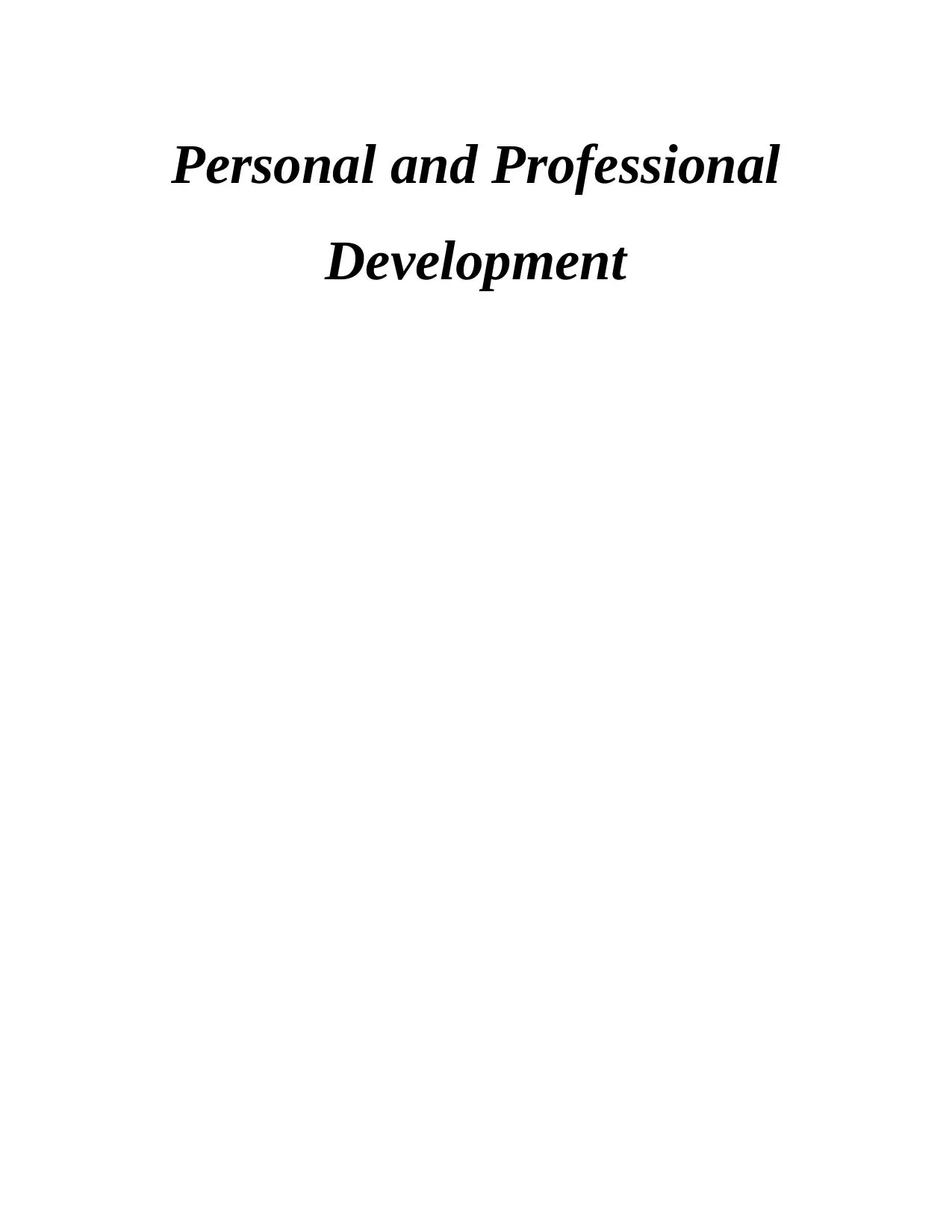
Personal and Professional
Development
Development
Paraphrase This Document
Need a fresh take? Get an instant paraphrase of this document with our AI Paraphraser
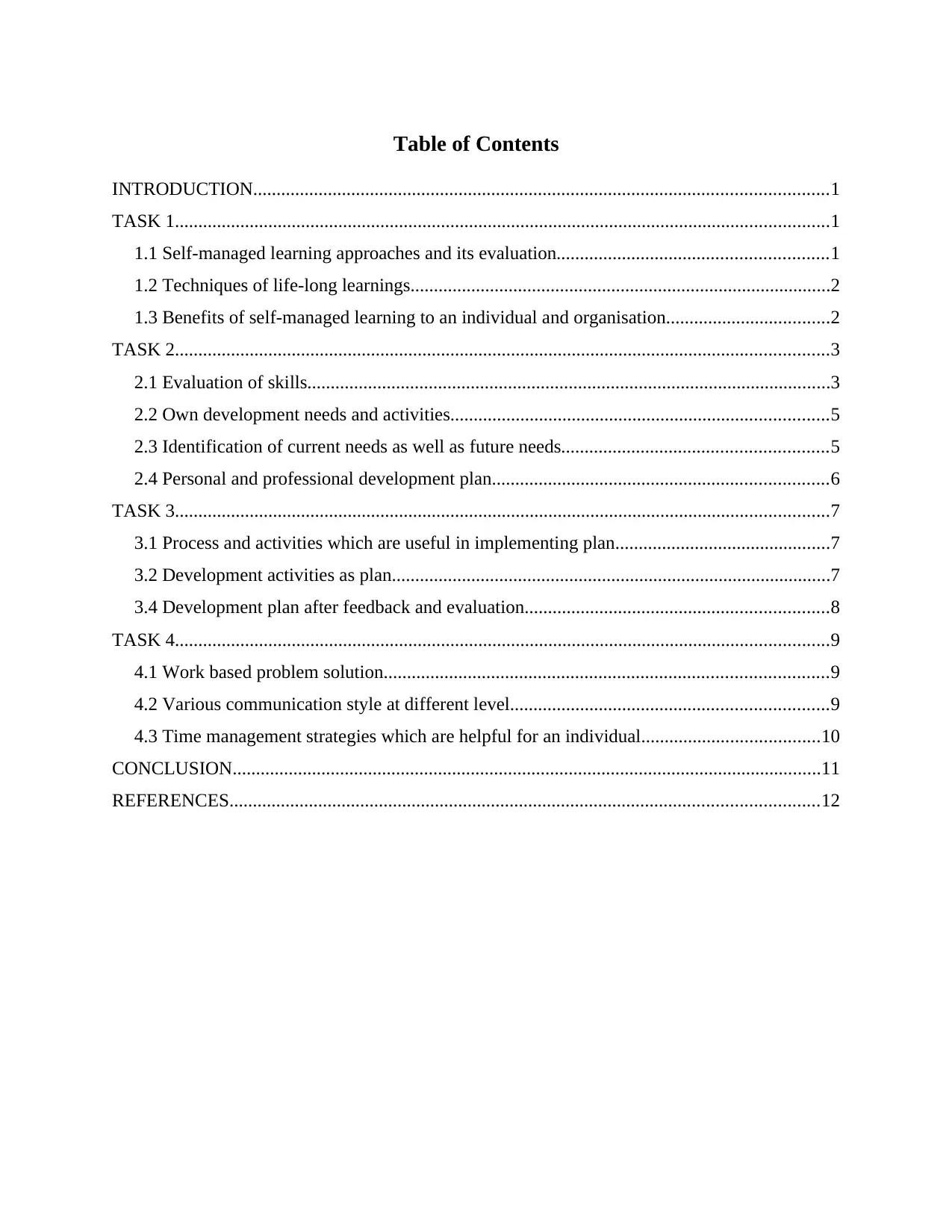
Table of Contents
INTRODUCTION...........................................................................................................................1
TASK 1............................................................................................................................................1
1.1 Self-managed learning approaches and its evaluation..........................................................1
1.2 Techniques of life-long learnings..........................................................................................2
1.3 Benefits of self-managed learning to an individual and organisation...................................2
TASK 2............................................................................................................................................3
2.1 Evaluation of skills................................................................................................................3
2.2 Own development needs and activities.................................................................................5
2.3 Identification of current needs as well as future needs.........................................................5
2.4 Personal and professional development plan........................................................................6
TASK 3............................................................................................................................................7
3.1 Process and activities which are useful in implementing plan..............................................7
3.2 Development activities as plan..............................................................................................7
3.4 Development plan after feedback and evaluation.................................................................8
TASK 4............................................................................................................................................9
4.1 Work based problem solution...............................................................................................9
4.2 Various communication style at different level....................................................................9
4.3 Time management strategies which are helpful for an individual......................................10
CONCLUSION..............................................................................................................................11
REFERENCES..............................................................................................................................12
INTRODUCTION...........................................................................................................................1
TASK 1............................................................................................................................................1
1.1 Self-managed learning approaches and its evaluation..........................................................1
1.2 Techniques of life-long learnings..........................................................................................2
1.3 Benefits of self-managed learning to an individual and organisation...................................2
TASK 2............................................................................................................................................3
2.1 Evaluation of skills................................................................................................................3
2.2 Own development needs and activities.................................................................................5
2.3 Identification of current needs as well as future needs.........................................................5
2.4 Personal and professional development plan........................................................................6
TASK 3............................................................................................................................................7
3.1 Process and activities which are useful in implementing plan..............................................7
3.2 Development activities as plan..............................................................................................7
3.4 Development plan after feedback and evaluation.................................................................8
TASK 4............................................................................................................................................9
4.1 Work based problem solution...............................................................................................9
4.2 Various communication style at different level....................................................................9
4.3 Time management strategies which are helpful for an individual......................................10
CONCLUSION..............................................................................................................................11
REFERENCES..............................................................................................................................12

⊘ This is a preview!⊘
Do you want full access?
Subscribe today to unlock all pages.

Trusted by 1+ million students worldwide
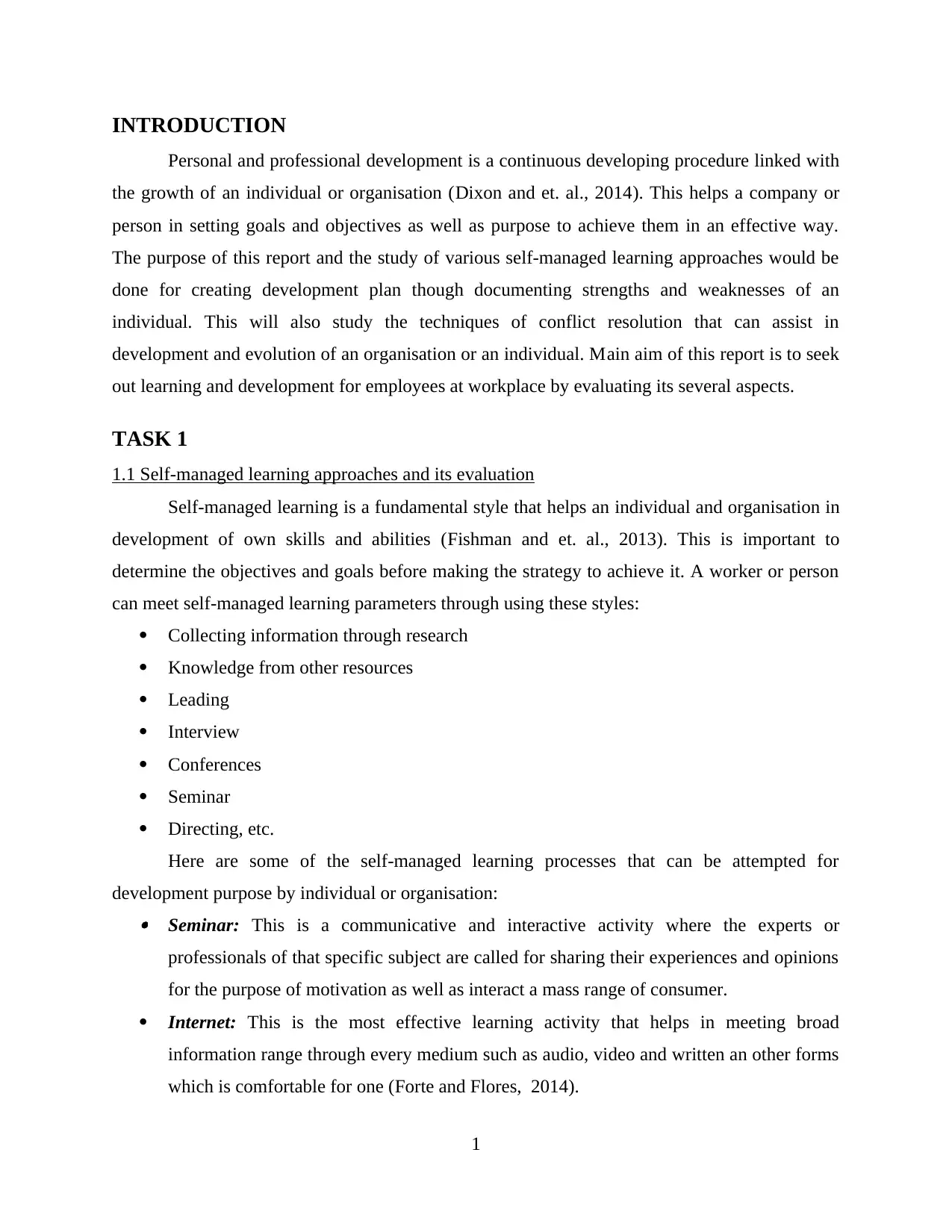
INTRODUCTION
Personal and professional development is a continuous developing procedure linked with
the growth of an individual or organisation (Dixon and et. al., 2014). This helps a company or
person in setting goals and objectives as well as purpose to achieve them in an effective way.
The purpose of this report and the study of various self-managed learning approaches would be
done for creating development plan though documenting strengths and weaknesses of an
individual. This will also study the techniques of conflict resolution that can assist in
development and evolution of an organisation or an individual. Main aim of this report is to seek
out learning and development for employees at workplace by evaluating its several aspects.
TASK 1
1.1 Self-managed learning approaches and its evaluation
Self-managed learning is a fundamental style that helps an individual and organisation in
development of own skills and abilities (Fishman and et. al., 2013). This is important to
determine the objectives and goals before making the strategy to achieve it. A worker or person
can meet self-managed learning parameters through using these styles:
Collecting information through research
Knowledge from other resources
Leading
Interview
Conferences
Seminar
Directing, etc.
Here are some of the self-managed learning processes that can be attempted for
development purpose by individual or organisation: Seminar: This is a communicative and interactive activity where the experts or
professionals of that specific subject are called for sharing their experiences and opinions
for the purpose of motivation as well as interact a mass range of consumer.
Internet: This is the most effective learning activity that helps in meeting broad
information range through every medium such as audio, video and written an other forms
which is comfortable for one (Forte and Flores, 2014).
1
Personal and professional development is a continuous developing procedure linked with
the growth of an individual or organisation (Dixon and et. al., 2014). This helps a company or
person in setting goals and objectives as well as purpose to achieve them in an effective way.
The purpose of this report and the study of various self-managed learning approaches would be
done for creating development plan though documenting strengths and weaknesses of an
individual. This will also study the techniques of conflict resolution that can assist in
development and evolution of an organisation or an individual. Main aim of this report is to seek
out learning and development for employees at workplace by evaluating its several aspects.
TASK 1
1.1 Self-managed learning approaches and its evaluation
Self-managed learning is a fundamental style that helps an individual and organisation in
development of own skills and abilities (Fishman and et. al., 2013). This is important to
determine the objectives and goals before making the strategy to achieve it. A worker or person
can meet self-managed learning parameters through using these styles:
Collecting information through research
Knowledge from other resources
Leading
Interview
Conferences
Seminar
Directing, etc.
Here are some of the self-managed learning processes that can be attempted for
development purpose by individual or organisation: Seminar: This is a communicative and interactive activity where the experts or
professionals of that specific subject are called for sharing their experiences and opinions
for the purpose of motivation as well as interact a mass range of consumer.
Internet: This is the most effective learning activity that helps in meeting broad
information range through every medium such as audio, video and written an other forms
which is comfortable for one (Forte and Flores, 2014).
1
Paraphrase This Document
Need a fresh take? Get an instant paraphrase of this document with our AI Paraphraser
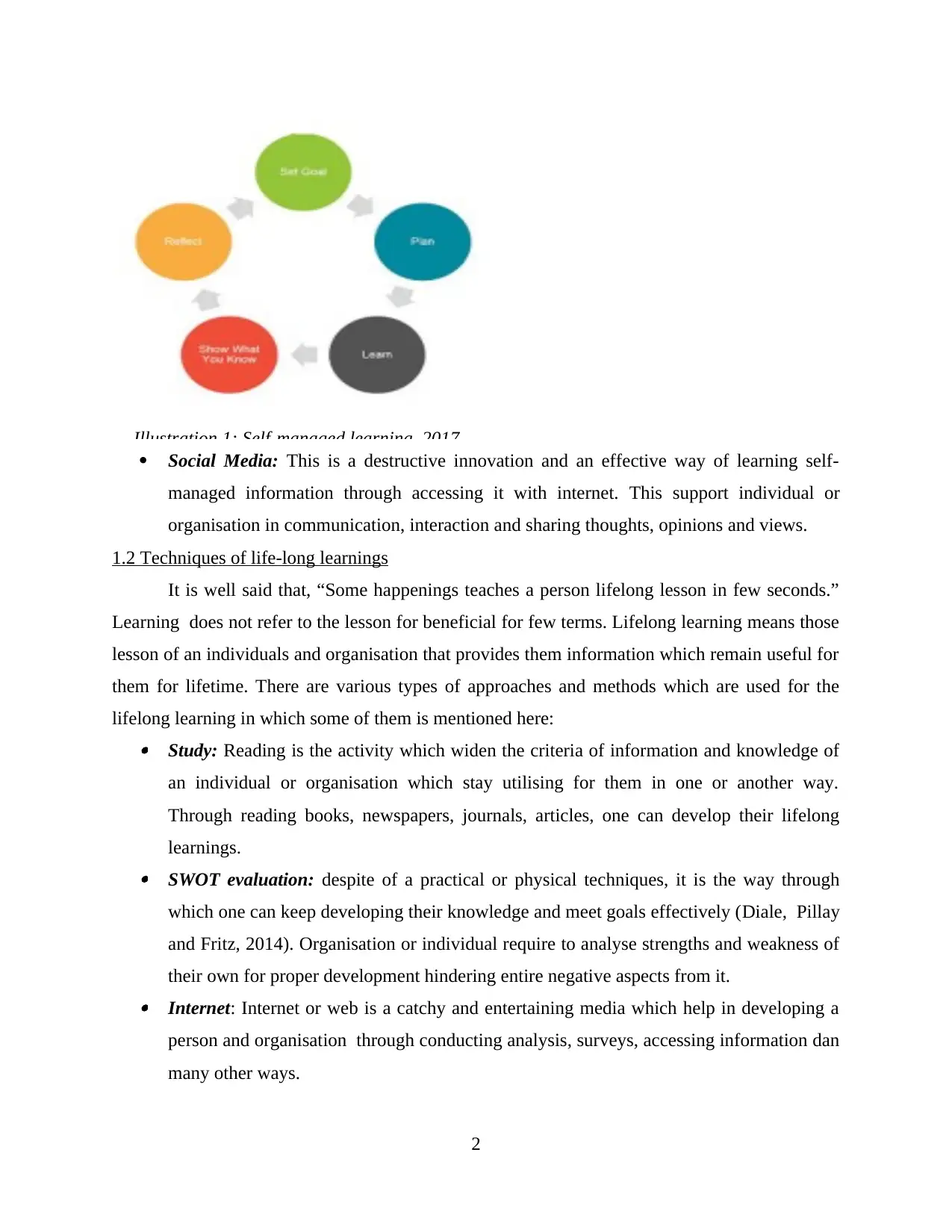
Illustration 1: Self-managed learning, 2017
Social Media: This is a destructive innovation and an effective way of learning self-
managed information through accessing it with internet. This support individual or
organisation in communication, interaction and sharing thoughts, opinions and views.
1.2 Techniques of life-long learnings
It is well said that, “Some happenings teaches a person lifelong lesson in few seconds.”
Learning does not refer to the lesson for beneficial for few terms. Lifelong learning means those
lesson of an individuals and organisation that provides them information which remain useful for
them for lifetime. There are various types of approaches and methods which are used for the
lifelong learning in which some of them is mentioned here: Study: Reading is the activity which widen the criteria of information and knowledge of
an individual or organisation which stay utilising for them in one or another way.
Through reading books, newspapers, journals, articles, one can develop their lifelong
learnings. SWOT evaluation: despite of a practical or physical techniques, it is the way through
which one can keep developing their knowledge and meet goals effectively (Diale, Pillay
and Fritz, 2014). Organisation or individual require to analyse strengths and weakness of
their own for proper development hindering entire negative aspects from it. Internet: Internet or web is a catchy and entertaining media which help in developing a
person and organisation through conducting analysis, surveys, accessing information dan
many other ways.
2
Social Media: This is a destructive innovation and an effective way of learning self-
managed information through accessing it with internet. This support individual or
organisation in communication, interaction and sharing thoughts, opinions and views.
1.2 Techniques of life-long learnings
It is well said that, “Some happenings teaches a person lifelong lesson in few seconds.”
Learning does not refer to the lesson for beneficial for few terms. Lifelong learning means those
lesson of an individuals and organisation that provides them information which remain useful for
them for lifetime. There are various types of approaches and methods which are used for the
lifelong learning in which some of them is mentioned here: Study: Reading is the activity which widen the criteria of information and knowledge of
an individual or organisation which stay utilising for them in one or another way.
Through reading books, newspapers, journals, articles, one can develop their lifelong
learnings. SWOT evaluation: despite of a practical or physical techniques, it is the way through
which one can keep developing their knowledge and meet goals effectively (Diale, Pillay
and Fritz, 2014). Organisation or individual require to analyse strengths and weakness of
their own for proper development hindering entire negative aspects from it. Internet: Internet or web is a catchy and entertaining media which help in developing a
person and organisation through conducting analysis, surveys, accessing information dan
many other ways.
2
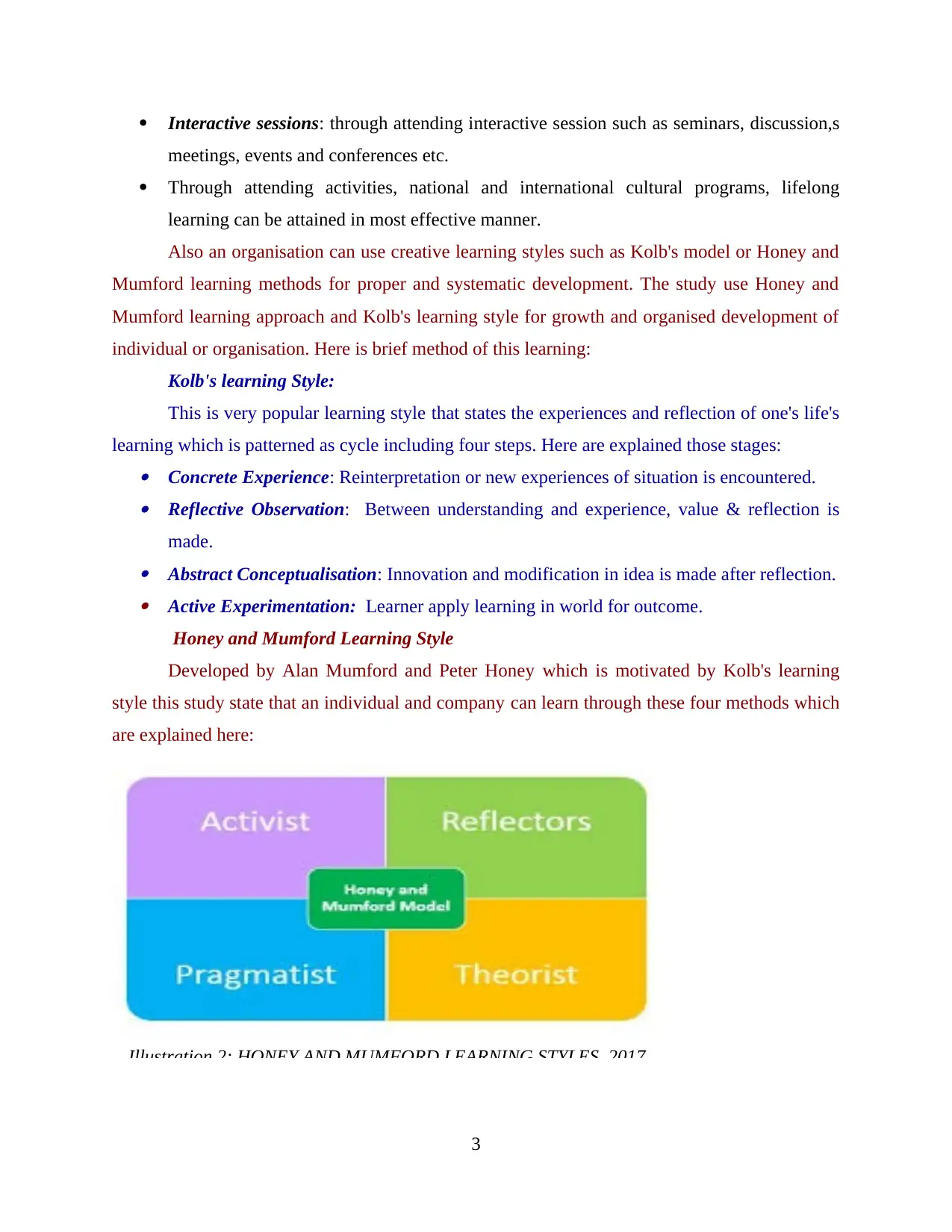
Interactive sessions: through attending interactive session such as seminars, discussion,s
meetings, events and conferences etc.
Through attending activities, national and international cultural programs, lifelong
learning can be attained in most effective manner.
Also an organisation can use creative learning styles such as Kolb's model or Honey and
Mumford learning methods for proper and systematic development. The study use Honey and
Mumford learning approach and Kolb's learning style for growth and organised development of
individual or organisation. Here is brief method of this learning:
Kolb's learning Style:
This is very popular learning style that states the experiences and reflection of one's life's
learning which is patterned as cycle including four steps. Here are explained those stages: Concrete Experience: Reinterpretation or new experiences of situation is encountered. Reflective Observation: Between understanding and experience, value & reflection is
made. Abstract Conceptualisation: Innovation and modification in idea is made after reflection. Active Experimentation: Learner apply learning in world for outcome.
Honey and Mumford Learning Style
Developed by Alan Mumford and Peter Honey which is motivated by Kolb's learning
style this study state that an individual and company can learn through these four methods which
are explained here:
Illustration 2: HONEY AND MUMFORD LEARNING STYLES, 2017
3
meetings, events and conferences etc.
Through attending activities, national and international cultural programs, lifelong
learning can be attained in most effective manner.
Also an organisation can use creative learning styles such as Kolb's model or Honey and
Mumford learning methods for proper and systematic development. The study use Honey and
Mumford learning approach and Kolb's learning style for growth and organised development of
individual or organisation. Here is brief method of this learning:
Kolb's learning Style:
This is very popular learning style that states the experiences and reflection of one's life's
learning which is patterned as cycle including four steps. Here are explained those stages: Concrete Experience: Reinterpretation or new experiences of situation is encountered. Reflective Observation: Between understanding and experience, value & reflection is
made. Abstract Conceptualisation: Innovation and modification in idea is made after reflection. Active Experimentation: Learner apply learning in world for outcome.
Honey and Mumford Learning Style
Developed by Alan Mumford and Peter Honey which is motivated by Kolb's learning
style this study state that an individual and company can learn through these four methods which
are explained here:
Illustration 2: HONEY AND MUMFORD LEARNING STYLES, 2017
3
⊘ This is a preview!⊘
Do you want full access?
Subscribe today to unlock all pages.

Trusted by 1+ million students worldwide
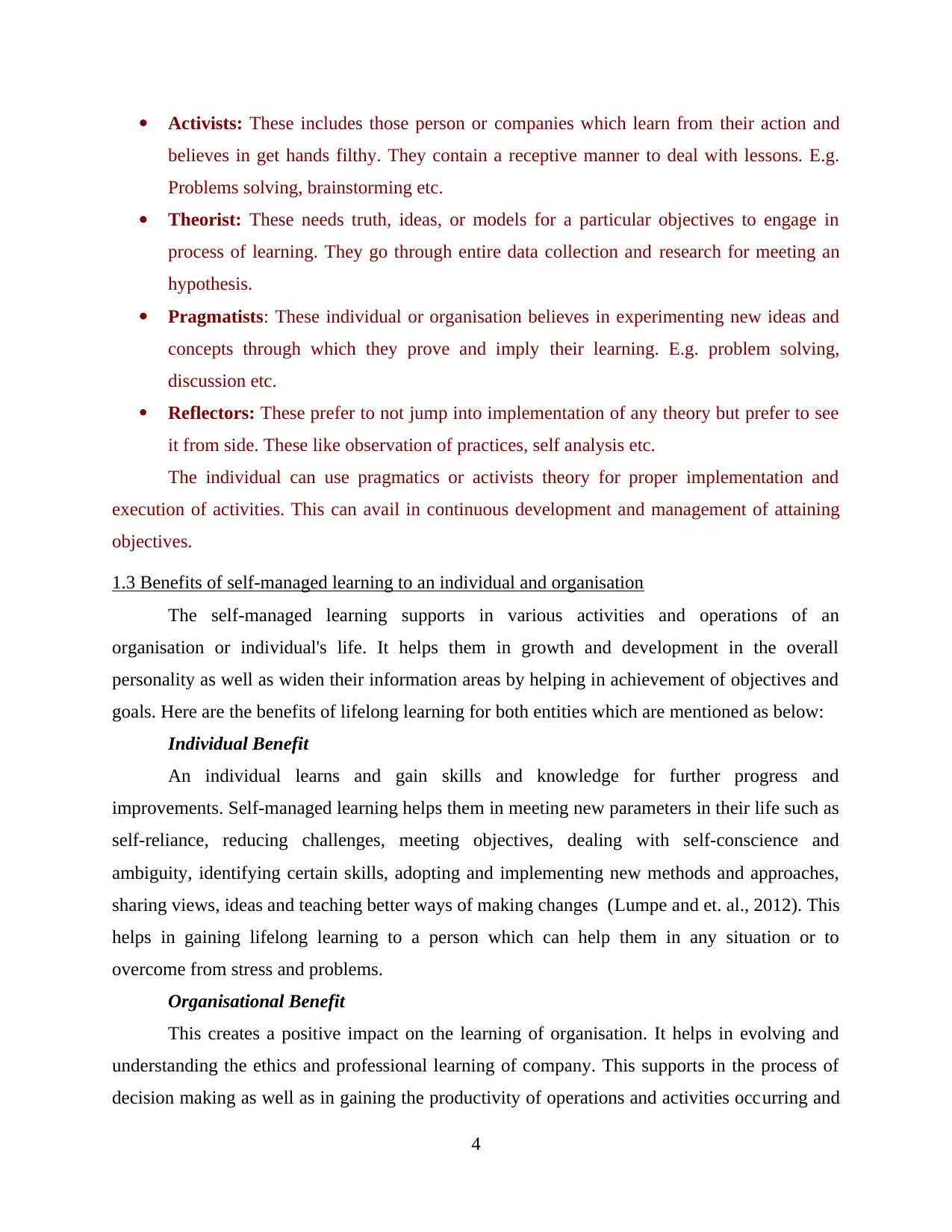
Activists: These includes those person or companies which learn from their action and
believes in get hands filthy. They contain a receptive manner to deal with lessons. E.g.
Problems solving, brainstorming etc.
Theorist: These needs truth, ideas, or models for a particular objectives to engage in
process of learning. They go through entire data collection and research for meeting an
hypothesis.
Pragmatists: These individual or organisation believes in experimenting new ideas and
concepts through which they prove and imply their learning. E.g. problem solving,
discussion etc.
Reflectors: These prefer to not jump into implementation of any theory but prefer to see
it from side. These like observation of practices, self analysis etc.
The individual can use pragmatics or activists theory for proper implementation and
execution of activities. This can avail in continuous development and management of attaining
objectives.
1.3 Benefits of self-managed learning to an individual and organisation
The self-managed learning supports in various activities and operations of an
organisation or individual's life. It helps them in growth and development in the overall
personality as well as widen their information areas by helping in achievement of objectives and
goals. Here are the benefits of lifelong learning for both entities which are mentioned as below:
Individual Benefit
An individual learns and gain skills and knowledge for further progress and
improvements. Self-managed learning helps them in meeting new parameters in their life such as
self-reliance, reducing challenges, meeting objectives, dealing with self-conscience and
ambiguity, identifying certain skills, adopting and implementing new methods and approaches,
sharing views, ideas and teaching better ways of making changes (Lumpe and et. al., 2012). This
helps in gaining lifelong learning to a person which can help them in any situation or to
overcome from stress and problems.
Organisational Benefit
This creates a positive impact on the learning of organisation. It helps in evolving and
understanding the ethics and professional learning of company. This supports in the process of
decision making as well as in gaining the productivity of operations and activities occurring and
4
believes in get hands filthy. They contain a receptive manner to deal with lessons. E.g.
Problems solving, brainstorming etc.
Theorist: These needs truth, ideas, or models for a particular objectives to engage in
process of learning. They go through entire data collection and research for meeting an
hypothesis.
Pragmatists: These individual or organisation believes in experimenting new ideas and
concepts through which they prove and imply their learning. E.g. problem solving,
discussion etc.
Reflectors: These prefer to not jump into implementation of any theory but prefer to see
it from side. These like observation of practices, self analysis etc.
The individual can use pragmatics or activists theory for proper implementation and
execution of activities. This can avail in continuous development and management of attaining
objectives.
1.3 Benefits of self-managed learning to an individual and organisation
The self-managed learning supports in various activities and operations of an
organisation or individual's life. It helps them in growth and development in the overall
personality as well as widen their information areas by helping in achievement of objectives and
goals. Here are the benefits of lifelong learning for both entities which are mentioned as below:
Individual Benefit
An individual learns and gain skills and knowledge for further progress and
improvements. Self-managed learning helps them in meeting new parameters in their life such as
self-reliance, reducing challenges, meeting objectives, dealing with self-conscience and
ambiguity, identifying certain skills, adopting and implementing new methods and approaches,
sharing views, ideas and teaching better ways of making changes (Lumpe and et. al., 2012). This
helps in gaining lifelong learning to a person which can help them in any situation or to
overcome from stress and problems.
Organisational Benefit
This creates a positive impact on the learning of organisation. It helps in evolving and
understanding the ethics and professional learning of company. This supports in the process of
decision making as well as in gaining the productivity of operations and activities occurring and
4
Paraphrase This Document
Need a fresh take? Get an instant paraphrase of this document with our AI Paraphraser
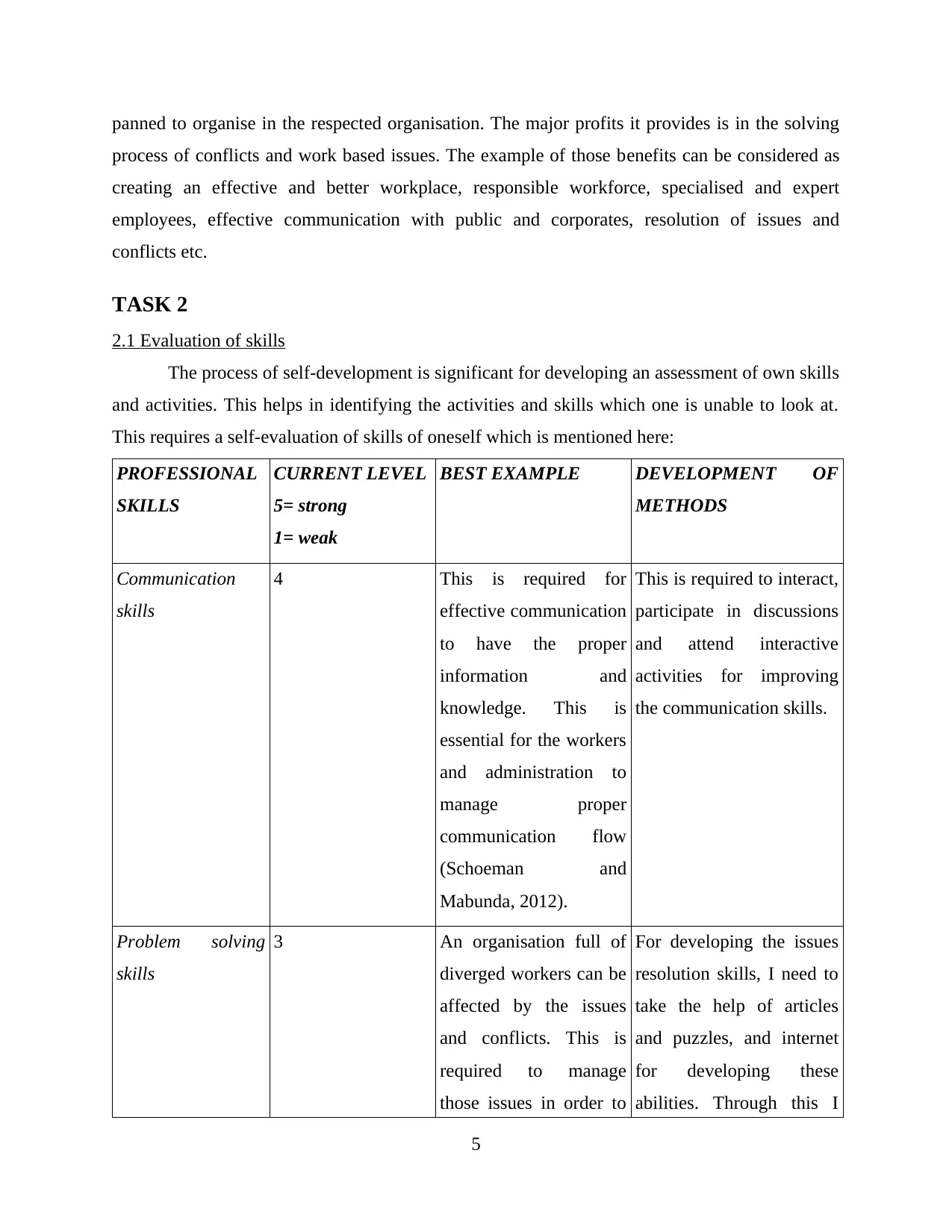
panned to organise in the respected organisation. The major profits it provides is in the solving
process of conflicts and work based issues. The example of those benefits can be considered as
creating an effective and better workplace, responsible workforce, specialised and expert
employees, effective communication with public and corporates, resolution of issues and
conflicts etc.
TASK 2
2.1 Evaluation of skills
The process of self-development is significant for developing an assessment of own skills
and activities. This helps in identifying the activities and skills which one is unable to look at.
This requires a self-evaluation of skills of oneself which is mentioned here:
PROFESSIONAL
SKILLS
CURRENT LEVEL
5= strong
1= weak
BEST EXAMPLE DEVELOPMENT OF
METHODS
Communication
skills
4 This is required for
effective communication
to have the proper
information and
knowledge. This is
essential for the workers
and administration to
manage proper
communication flow
(Schoeman and
Mabunda, 2012).
This is required to interact,
participate in discussions
and attend interactive
activities for improving
the communication skills.
Problem solving
skills
3 An organisation full of
diverged workers can be
affected by the issues
and conflicts. This is
required to manage
those issues in order to
For developing the issues
resolution skills, I need to
take the help of articles
and puzzles, and internet
for developing these
abilities. Through this I
5
process of conflicts and work based issues. The example of those benefits can be considered as
creating an effective and better workplace, responsible workforce, specialised and expert
employees, effective communication with public and corporates, resolution of issues and
conflicts etc.
TASK 2
2.1 Evaluation of skills
The process of self-development is significant for developing an assessment of own skills
and activities. This helps in identifying the activities and skills which one is unable to look at.
This requires a self-evaluation of skills of oneself which is mentioned here:
PROFESSIONAL
SKILLS
CURRENT LEVEL
5= strong
1= weak
BEST EXAMPLE DEVELOPMENT OF
METHODS
Communication
skills
4 This is required for
effective communication
to have the proper
information and
knowledge. This is
essential for the workers
and administration to
manage proper
communication flow
(Schoeman and
Mabunda, 2012).
This is required to interact,
participate in discussions
and attend interactive
activities for improving
the communication skills.
Problem solving
skills
3 An organisation full of
diverged workers can be
affected by the issues
and conflicts. This is
required to manage
those issues in order to
For developing the issues
resolution skills, I need to
take the help of articles
and puzzles, and internet
for developing these
abilities. Through this I
5
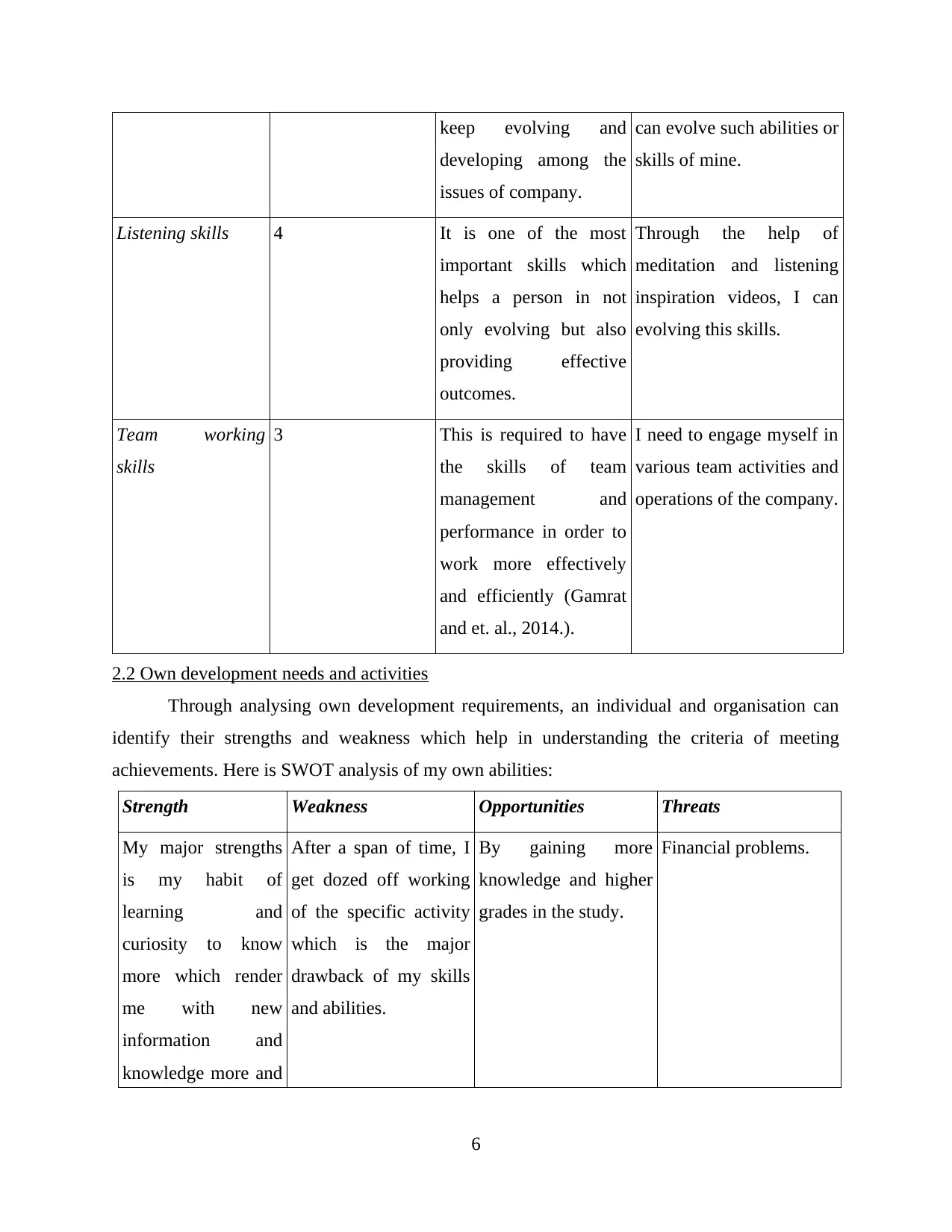
keep evolving and
developing among the
issues of company.
can evolve such abilities or
skills of mine.
Listening skills 4 It is one of the most
important skills which
helps a person in not
only evolving but also
providing effective
outcomes.
Through the help of
meditation and listening
inspiration videos, I can
evolving this skills.
Team working
skills
3 This is required to have
the skills of team
management and
performance in order to
work more effectively
and efficiently (Gamrat
and et. al., 2014.).
I need to engage myself in
various team activities and
operations of the company.
2.2 Own development needs and activities
Through analysing own development requirements, an individual and organisation can
identify their strengths and weakness which help in understanding the criteria of meeting
achievements. Here is SWOT analysis of my own abilities:
Strength Weakness Opportunities Threats
My major strengths
is my habit of
learning and
curiosity to know
more which render
me with new
information and
knowledge more and
After a span of time, I
get dozed off working
of the specific activity
which is the major
drawback of my skills
and abilities.
By gaining more
knowledge and higher
grades in the study.
Financial problems.
6
developing among the
issues of company.
can evolve such abilities or
skills of mine.
Listening skills 4 It is one of the most
important skills which
helps a person in not
only evolving but also
providing effective
outcomes.
Through the help of
meditation and listening
inspiration videos, I can
evolving this skills.
Team working
skills
3 This is required to have
the skills of team
management and
performance in order to
work more effectively
and efficiently (Gamrat
and et. al., 2014.).
I need to engage myself in
various team activities and
operations of the company.
2.2 Own development needs and activities
Through analysing own development requirements, an individual and organisation can
identify their strengths and weakness which help in understanding the criteria of meeting
achievements. Here is SWOT analysis of my own abilities:
Strength Weakness Opportunities Threats
My major strengths
is my habit of
learning and
curiosity to know
more which render
me with new
information and
knowledge more and
After a span of time, I
get dozed off working
of the specific activity
which is the major
drawback of my skills
and abilities.
By gaining more
knowledge and higher
grades in the study.
Financial problems.
6
⊘ This is a preview!⊘
Do you want full access?
Subscribe today to unlock all pages.

Trusted by 1+ million students worldwide
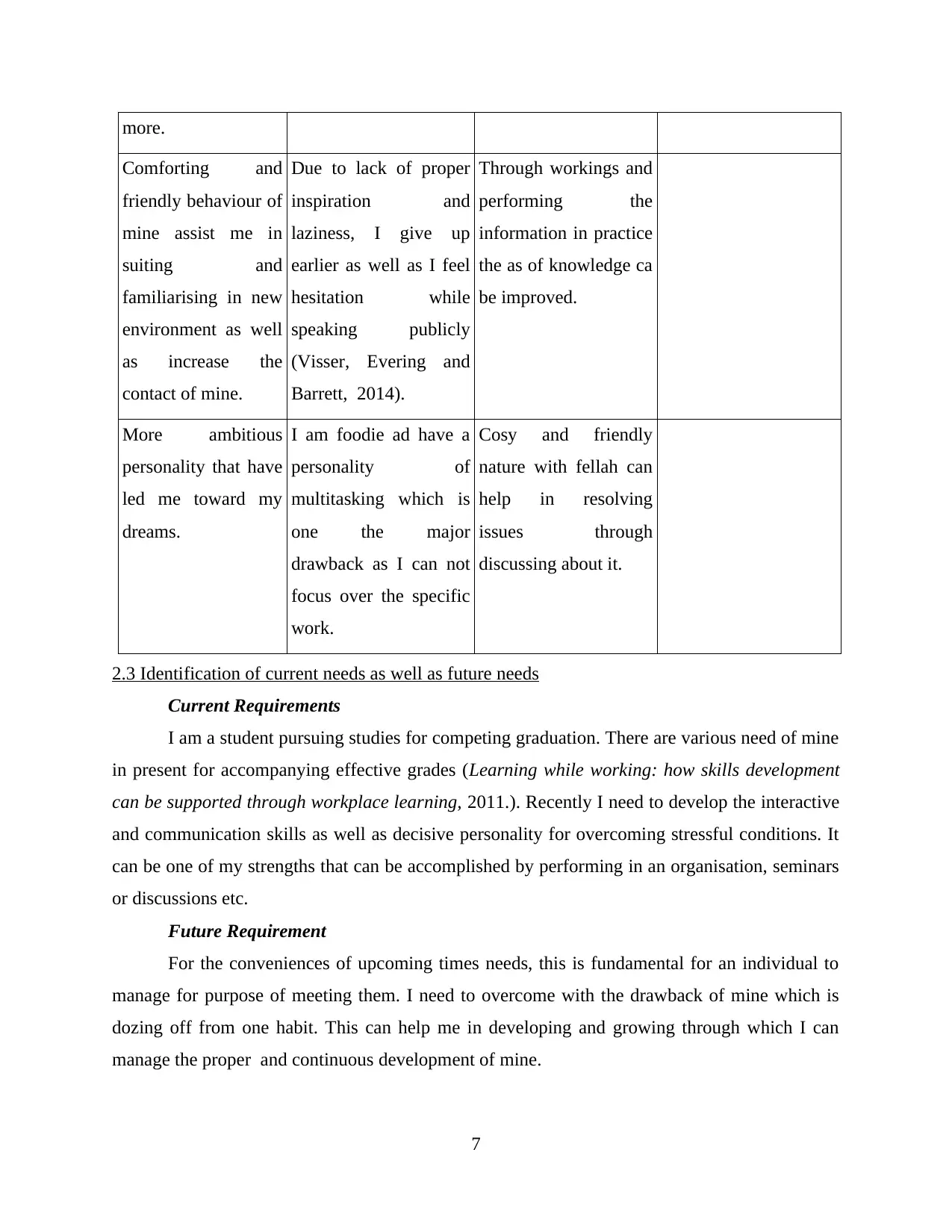
more.
Comforting and
friendly behaviour of
mine assist me in
suiting and
familiarising in new
environment as well
as increase the
contact of mine.
Due to lack of proper
inspiration and
laziness, I give up
earlier as well as I feel
hesitation while
speaking publicly
(Visser, Evering and
Barrett, 2014).
Through workings and
performing the
information in practice
the as of knowledge ca
be improved.
More ambitious
personality that have
led me toward my
dreams.
I am foodie ad have a
personality of
multitasking which is
one the major
drawback as I can not
focus over the specific
work.
Cosy and friendly
nature with fellah can
help in resolving
issues through
discussing about it.
2.3 Identification of current needs as well as future needs
Current Requirements
I am a student pursuing studies for competing graduation. There are various need of mine
in present for accompanying effective grades (Learning while working: how skills development
can be supported through workplace learning, 2011.). Recently I need to develop the interactive
and communication skills as well as decisive personality for overcoming stressful conditions. It
can be one of my strengths that can be accomplished by performing in an organisation, seminars
or discussions etc.
Future Requirement
For the conveniences of upcoming times needs, this is fundamental for an individual to
manage for purpose of meeting them. I need to overcome with the drawback of mine which is
dozing off from one habit. This can help me in developing and growing through which I can
manage the proper and continuous development of mine.
7
Comforting and
friendly behaviour of
mine assist me in
suiting and
familiarising in new
environment as well
as increase the
contact of mine.
Due to lack of proper
inspiration and
laziness, I give up
earlier as well as I feel
hesitation while
speaking publicly
(Visser, Evering and
Barrett, 2014).
Through workings and
performing the
information in practice
the as of knowledge ca
be improved.
More ambitious
personality that have
led me toward my
dreams.
I am foodie ad have a
personality of
multitasking which is
one the major
drawback as I can not
focus over the specific
work.
Cosy and friendly
nature with fellah can
help in resolving
issues through
discussing about it.
2.3 Identification of current needs as well as future needs
Current Requirements
I am a student pursuing studies for competing graduation. There are various need of mine
in present for accompanying effective grades (Learning while working: how skills development
can be supported through workplace learning, 2011.). Recently I need to develop the interactive
and communication skills as well as decisive personality for overcoming stressful conditions. It
can be one of my strengths that can be accomplished by performing in an organisation, seminars
or discussions etc.
Future Requirement
For the conveniences of upcoming times needs, this is fundamental for an individual to
manage for purpose of meeting them. I need to overcome with the drawback of mine which is
dozing off from one habit. This can help me in developing and growing through which I can
manage the proper and continuous development of mine.
7
Paraphrase This Document
Need a fresh take? Get an instant paraphrase of this document with our AI Paraphraser
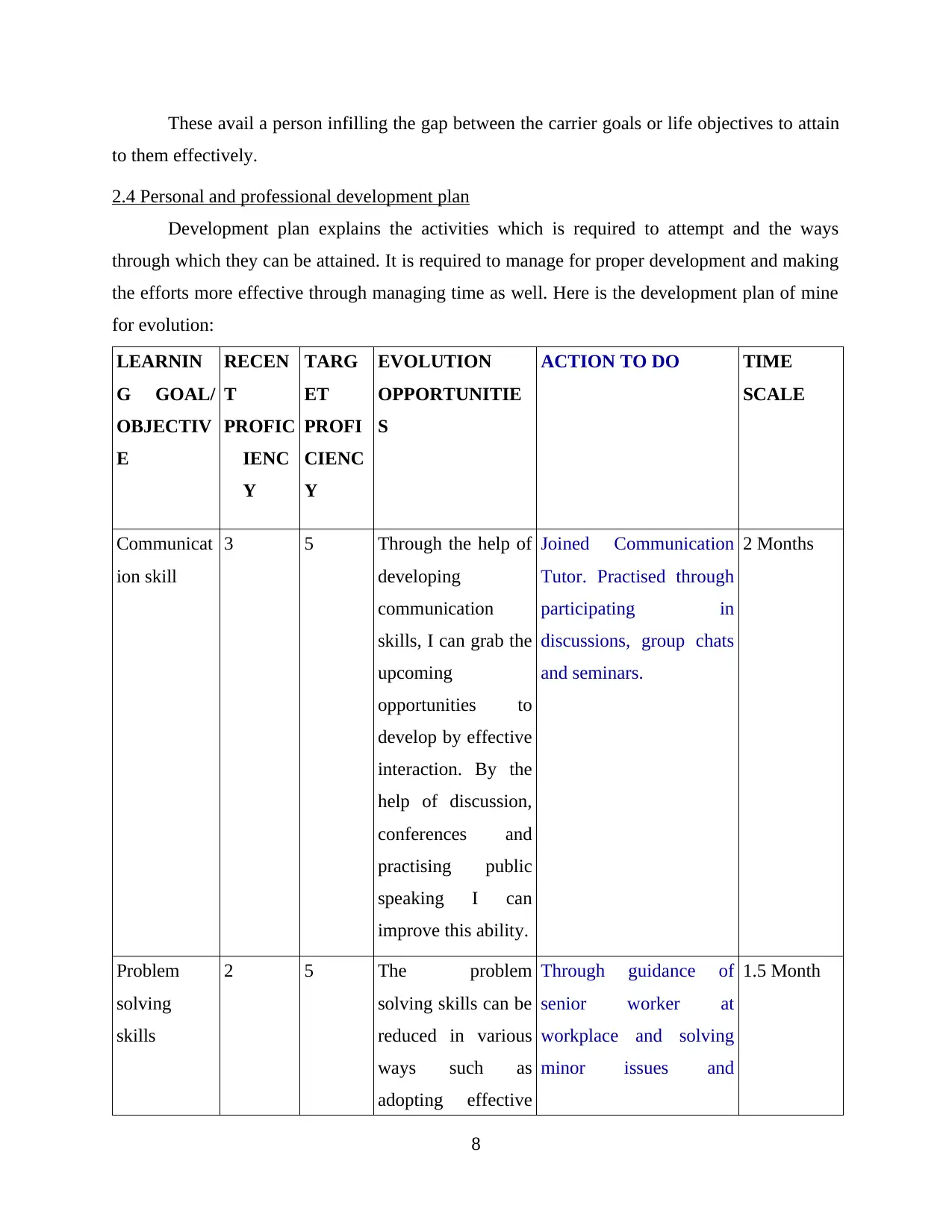
These avail a person infilling the gap between the carrier goals or life objectives to attain
to them effectively.
2.4 Personal and professional development plan
Development plan explains the activities which is required to attempt and the ways
through which they can be attained. It is required to manage for proper development and making
the efforts more effective through managing time as well. Here is the development plan of mine
for evolution:
LEARNIN
G GOAL/
OBJECTIV
E
RECEN
T
PROFIC
IENC
Y
TARG
ET
PROFI
CIENC
Y
EVOLUTION
OPPORTUNITIE
S
ACTION TO DO TIME
SCALE
Communicat
ion skill
3 5 Through the help of
developing
communication
skills, I can grab the
upcoming
opportunities to
develop by effective
interaction. By the
help of discussion,
conferences and
practising public
speaking I can
improve this ability.
Joined Communication
Tutor. Practised through
participating in
discussions, group chats
and seminars.
2 Months
Problem
solving
skills
2 5 The problem
solving skills can be
reduced in various
ways such as
adopting effective
Through guidance of
senior worker at
workplace and solving
minor issues and
1.5 Month
8
to them effectively.
2.4 Personal and professional development plan
Development plan explains the activities which is required to attempt and the ways
through which they can be attained. It is required to manage for proper development and making
the efforts more effective through managing time as well. Here is the development plan of mine
for evolution:
LEARNIN
G GOAL/
OBJECTIV
E
RECEN
T
PROFIC
IENC
Y
TARG
ET
PROFI
CIENC
Y
EVOLUTION
OPPORTUNITIE
S
ACTION TO DO TIME
SCALE
Communicat
ion skill
3 5 Through the help of
developing
communication
skills, I can grab the
upcoming
opportunities to
develop by effective
interaction. By the
help of discussion,
conferences and
practising public
speaking I can
improve this ability.
Joined Communication
Tutor. Practised through
participating in
discussions, group chats
and seminars.
2 Months
Problem
solving
skills
2 5 The problem
solving skills can be
reduced in various
ways such as
adopting effective
Through guidance of
senior worker at
workplace and solving
minor issues and
1.5 Month
8
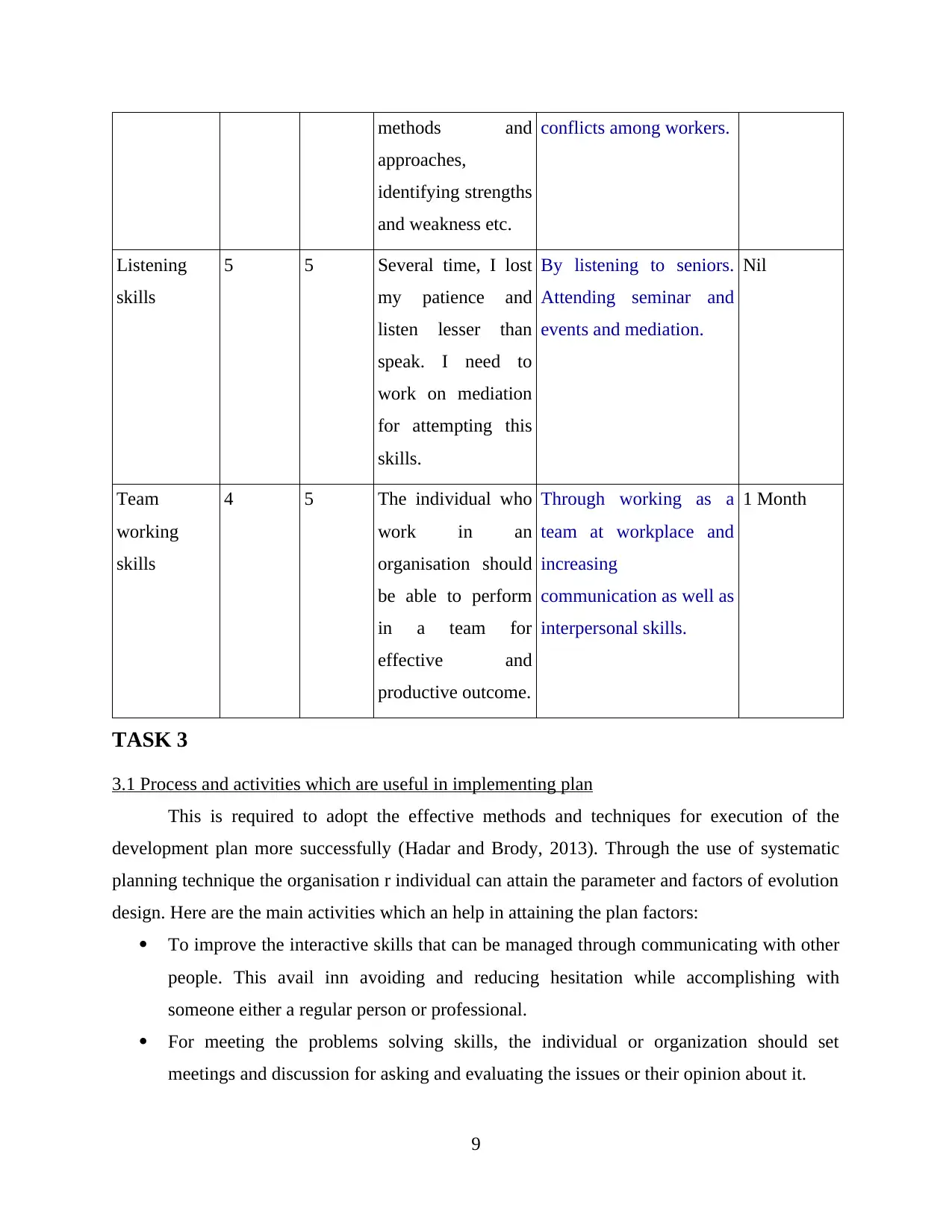
methods and
approaches,
identifying strengths
and weakness etc.
conflicts among workers.
Listening
skills
5 5 Several time, I lost
my patience and
listen lesser than
speak. I need to
work on mediation
for attempting this
skills.
By listening to seniors.
Attending seminar and
events and mediation.
Nil
Team
working
skills
4 5 The individual who
work in an
organisation should
be able to perform
in a team for
effective and
productive outcome.
Through working as a
team at workplace and
increasing
communication as well as
interpersonal skills.
1 Month
TASK 3
3.1 Process and activities which are useful in implementing plan
This is required to adopt the effective methods and techniques for execution of the
development plan more successfully (Hadar and Brody, 2013). Through the use of systematic
planning technique the organisation r individual can attain the parameter and factors of evolution
design. Here are the main activities which an help in attaining the plan factors:
To improve the interactive skills that can be managed through communicating with other
people. This avail inn avoiding and reducing hesitation while accomplishing with
someone either a regular person or professional.
For meeting the problems solving skills, the individual or organization should set
meetings and discussion for asking and evaluating the issues or their opinion about it.
9
approaches,
identifying strengths
and weakness etc.
conflicts among workers.
Listening
skills
5 5 Several time, I lost
my patience and
listen lesser than
speak. I need to
work on mediation
for attempting this
skills.
By listening to seniors.
Attending seminar and
events and mediation.
Nil
Team
working
skills
4 5 The individual who
work in an
organisation should
be able to perform
in a team for
effective and
productive outcome.
Through working as a
team at workplace and
increasing
communication as well as
interpersonal skills.
1 Month
TASK 3
3.1 Process and activities which are useful in implementing plan
This is required to adopt the effective methods and techniques for execution of the
development plan more successfully (Hadar and Brody, 2013). Through the use of systematic
planning technique the organisation r individual can attain the parameter and factors of evolution
design. Here are the main activities which an help in attaining the plan factors:
To improve the interactive skills that can be managed through communicating with other
people. This avail inn avoiding and reducing hesitation while accomplishing with
someone either a regular person or professional.
For meeting the problems solving skills, the individual or organization should set
meetings and discussion for asking and evaluating the issues or their opinion about it.
9
⊘ This is a preview!⊘
Do you want full access?
Subscribe today to unlock all pages.

Trusted by 1+ million students worldwide
1 out of 18
Related Documents
Your All-in-One AI-Powered Toolkit for Academic Success.
+13062052269
info@desklib.com
Available 24*7 on WhatsApp / Email
![[object Object]](/_next/static/media/star-bottom.7253800d.svg)
Unlock your academic potential
Copyright © 2020–2026 A2Z Services. All Rights Reserved. Developed and managed by ZUCOL.





